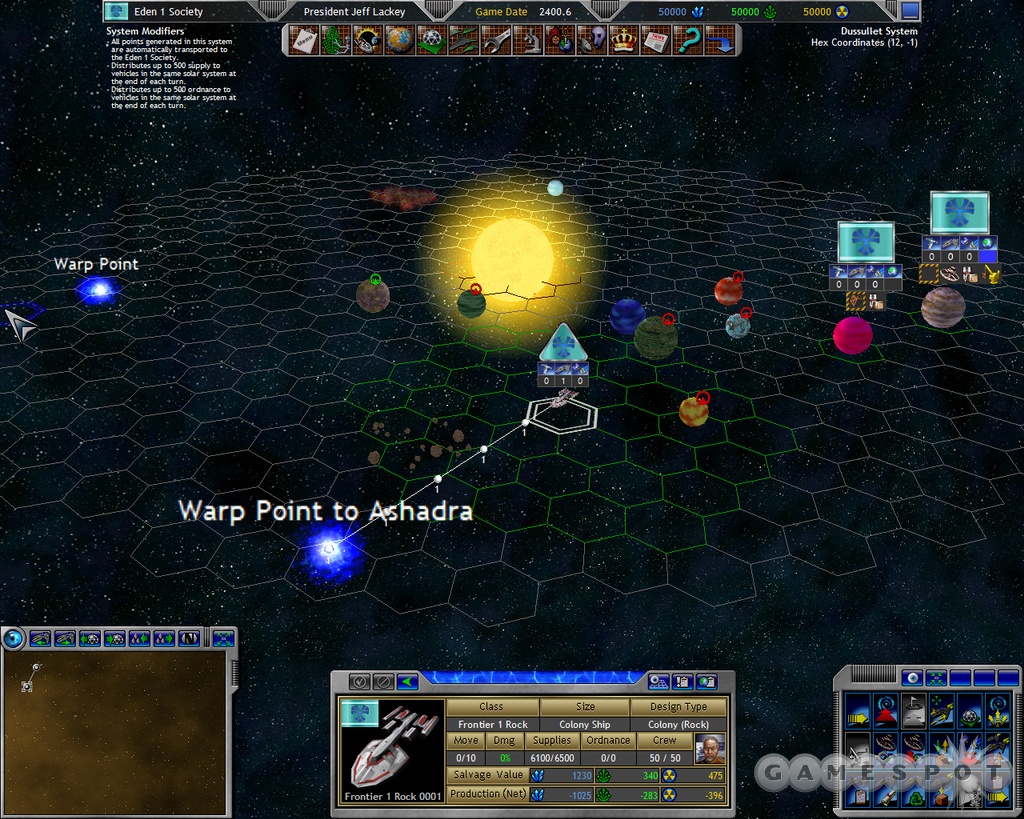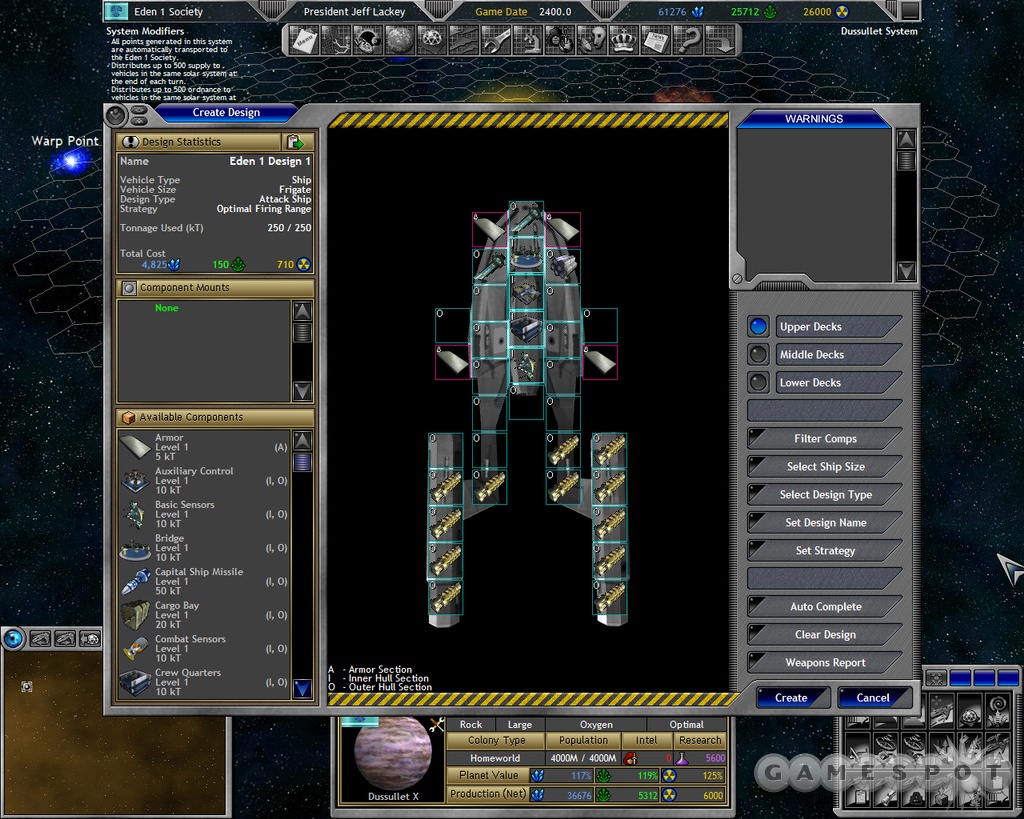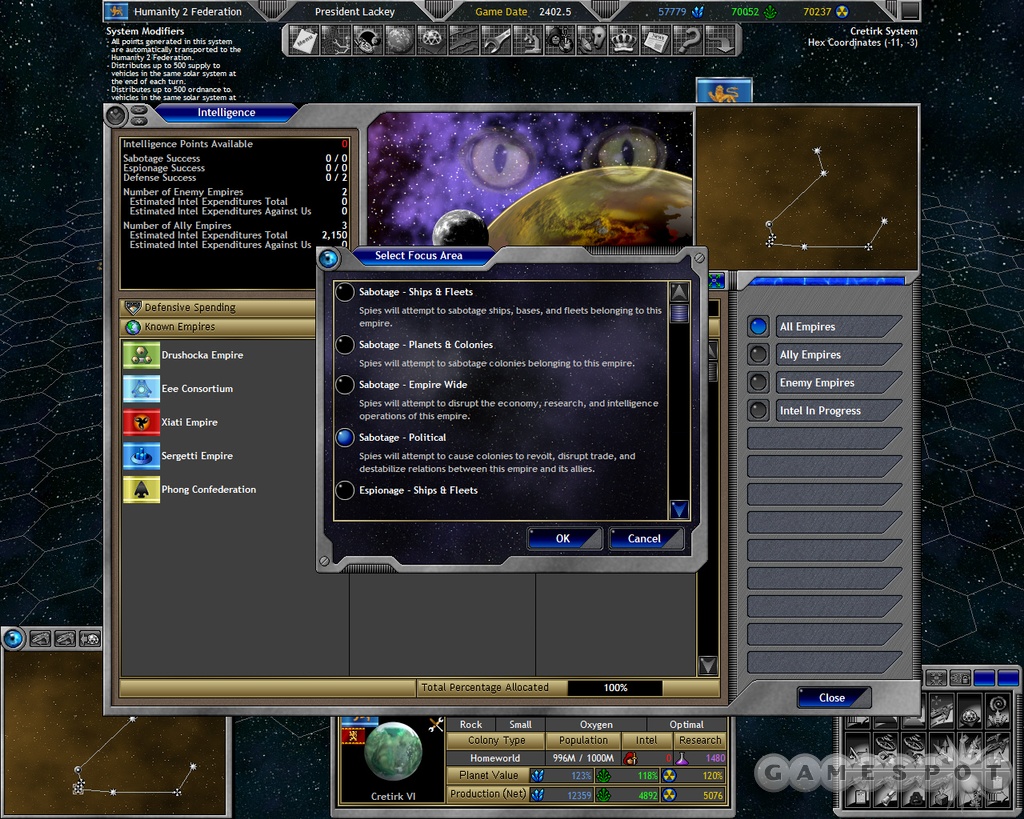Space Empires IV is a cult favorite among the space strategy crowd. Users have developed tweaks and mods with a fervor that rivals that of blockbuster megahits such as Oblivion, and the developer has a history of releasing numerous patches to address any issues that fans bring to its attention. That's good news for the newest addition to the series, Space Empires V, which has the basis for a great game--but it is ultimately bedeviled by a list of bugs as long as your arm.

The heart of strategic space-based 4X (Explore, Expand, Exploit, Exterminate) games hasn't changed much since the early classics (SSG's Reach for the Stars, Microprose's Master of Orion): You start on a home planet in a big galaxy and harvest resources that allow you to build ships, which you send out to explore space and discover strange new worlds. You try to develop new technologies faster than other civilizations so that you can conquer their worlds before they conquer yours, and when you rule the universe, you win. Since the "what you do" of these games pretty much stays the same, a new entry like Space Empires V has to differentiate itself on the "how you do it." For example, how do you build a fleet of ships that will dominate space? How do you develop the advanced technologies required to prosper in a hostile galaxy? How do you deal with newly discovered civilizations? Space Empires V differentiates itself from other games in this genre (such as Galactic Civilizations II) with superb depth and complexity. For example, you have almost unlimited flexibility in the type of ships you can design--you're presented with an assortment of hull types upon which you can place any variety of weapons, cargo pods, people support, sensors, armor, and much more. You can design and build carriers and load them with small, nimble fighters, or you can build unmanned drones. Units such as satellites, invisible mines, and unrelenting guided missiles that will track an enemy throughout the galaxy provide endless offensive and defensive options. As you develop new technologies, more options are made available. The flexibility and complexity in this module is unmatched, but the complexity comes with a price (a common theme in Space Empires V), as sometimes it may take a lot of work to determine, for example, how to design a carrier with the proper combination of appropriate storage spaces to allow the maximum number of onboard fighters.
Diplomacy is another strength of Space Empires V, and is a good point of comparison with other, similar games, like Galactic Civilizations II. In the latter game, communications and negotiations with other empires are relatively limited. You can offer peace treaties, declare war, ask for help against another civilization (such as help defend against or request that they go to war against another society), trade, offer, and accept gifts, and engage in a few other options. In Space Empires V you can do all of that and much more, and with significantly more depth for each option. For example, when you enter into a treaty with another civilization you can attach almost any condition you can think of to it. A treaty between equals may require both parties to share all intelligence, refitting and resupply capabilities, technology below a designated level, mutual defense, maps of systems and minefields, and such. But if one party feels they have a significant upper hand, they may make demands such as limiting the other civilization's access to their systems, forcing the weaker party to provide more access to information and technology than they will receive in return, or preventing the weaker society from engaging in further research. Other conditions can involve moral restrictions, such as a ban on viral warfare or bombarding planets. Throw in multiple options beyond treaties (such as global alliances with voting rights and more, demands, threats, and the like), each with a multitude of conditions, and the result is a diplomacy feature that is arguably unsurpassed in any 4X game.

But a closer look at Space Empires V reveals how different it is from its competitors. Unlike, for instance, the more-simplistic-but-fully-functional diplomacy of Galactic Civilizations II, Space Empires V's diplomacy options are beautifully deep, but ridden with bugs. Some are simply incorrect and confusing text descriptions of the results--for instance, you offer a tech trade, it is accepted, but the text response shows you exchanging the wrong techs, while in other cases the text correctly reflects your desire but the items exchanged are wrong. Neutral races don't seem to respond to communications at all. And it appears that AI civilizations can make treaties with each other that cripple them, such as two civilizations agreeing they will not do any research or expansion.
That trade-off of depth and complexity versus quality of execution is present throughout Space Empires V. The technology tree is huge, but some of the resulting technologies are broken, such as the shard cannon, which is no more powerful at level 50 than it is at level one due to what appears to be an unintentional error in the underlying algorithm. The ability to set up new games with a wide range of conditions and map sizes and customized races is offset by bugs such as occasional crashes on the large maps and racial traits that are opposite of what is intended (naturally happy races are actually naturally depressed and vice versa--a bug that can produce a lot of confusion as you try to figure out why your planet is rebelling!). Fleet operational options are impressive, but ordnance appears to randomly disappear from ships within fleets. Special items such as ruins add to the variety and sense of discovery that is essential to the atmosphere of a good space-strategy game--but the ruins disappear after the first turn. And the list goes on; Space Empires V is extremely deep, and very buggy.

Another area that demonstrates this trade-off is multiplayer. Space Empires V offers multiplayer, with options for both simultaneous-move and turn-based play. Galactic Civilizations II offers no multiplayer at all. However, the AI in single-player Galactic Civilizations II may be the best in computer gaming, exhibiting behavior that truly mimics the way that humans play in both intelligence and style, even to the point of making devious moves purely out of spite. While Space Empires V offers multiplayer, its AI is fairly simplistic and, in places, relatively poor. Again, which is more important to you--multiplayer capability, or outstanding AI?
Without a doubt, Space Empires V is an incredibly deep and complex strategy game that offers almost unlimited playing options and styles--which makes the bug infestation that much more regrettable. While the developer has had a reputation in the past for putting out patches to fix serious issues, it’s a shame Malfador didn’t wait until the game was in a more finished form before releasing it. If your tolerance for bugs is high and you’re willing to live with workarounds for some of the more serious issues, you may be happy with Space Empires V in its present form. But if you prefer your games fully baked when you plunk down your money for them, the best advice would be to watch the forums and wait to see if Malfador patches the game into a more stable form.